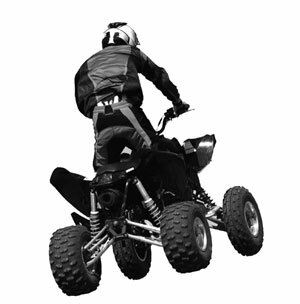NEWS- Those ATVs: Farmers' friends or deadly menace?

ATVs on the farm: helmets– yes, hot rodding– no.
STOCK PHOTO
They're solid, they're mature, and they grow our food. Yet farmers who zip about on ATVs are rolling the vehicles pretty regularly, and sometimes those flips become fatalities.
A recent article in Virginia Farm Bureau News and Features describes what happened to Free Union farmer Peter Easter when he went out about a year ago to check his fences. "I was only going about two miles per hour on the side of a hill," says Easter. His front wheel dropped into a washed out area covered by leaves and the next thing he knew, his 613-pound all-terrain vehicle was on top of him.
"I was all by myself, in an area no one knew where I was," says Easter. "Fortunately, the ATV righted itself and I was able to hobble over to it."
Easter sustained a broken leg and cracked ribs in the accident, and suffered from severe neck pain. A year later, he's still going to physical therapy.
Other farmers haven't been so lucky. Since 1997, there have been five ATV fatalities in Virginia, and 10 reported injuries– but Jimmy Maass thinks that number is low.
"Most go unreported," says Maass, safety coordinator at the Farm Bureau. His partner learned about Eater's mishap while he was doing a safety presentation.
Maass stresses using safety equipment, especially a helmet. But he admits that while he "usually" wears a helmet, he doesn't always. "When I first got [the ATV], I used it all the time," he admits.
All-terrain vehicles periodically come under fire as unsafe, with many people calling for government regulation. Should the off-road vehicles be banned from the farm?
"That would be like farmers not using a tractor," declares Maass. "I have two of them, and if I need to check fences, it's easy to jump on."
And anyway, most of the accidents are not from hot-rodding farmers. "Typically farmers aren't racing around doing stunts," says Maass.
A more likely cause of the increase in ATV accidents, according to Maass, is the increased age of farmers, coupled with slowed reaction times.
"I'm not a hot-rodding kid," concurs Easter, 69. Now, he doesn't wear a helmet, but says he's more careful on the vehicle. "The only reason I'm going into some of this is to save someone else from injury or death."
And he warns ATV riders: "They look low slung with a low center of gravity. But they turn over very easily. And the normal ATV is not made for two people to ride."
Liz Hart has three ATVs at her Brookside Farm, and she acknowledges the potential for danger, particularly with her teenage sons "who tend to be on the daring side."
The boys have to wear helmets, and Hart thinks it's important they not have more "bike" than they can handle. "They're selling 400-, 600- and 700-horsepower," says Hart. "That's a lot of power for a bike."
Her sons have had nicks and scrapes... and rollovers. "They pick it up and go on," says Hart. But their ATVs are a mere 200- and 250-horsepower; the boys are not allowed on her husband's 400-horsepower, four-wheel drive all-terrain vehicle.
Husband Jim Hart has flipped over, too, she says. "He's been riding since he was 11. He's learned, so he hasn't been hurt seriously."
Liz Hart extols the benefits of ATVs on the farm. "They can go places you can't get a truck in," she says. And they use less gas, have enough power to drag hay or cattle carcasses or logs, and with their lighter weight, they don't mess up the fields.
Ed Scharer falls in the anti-ATV camp. At his Route 53 farm, "I don't have any of those," he says. "I believe they're dangerous. Not only are they a pain in the tail, they're degrading to the environment."
Another ATV trend the Farm Bureau frowns on: using ATVs to herd cattle.
"We advocate not to do it," says the bureau's Maass. "It's dangerous and stressful on the cattle– and they could get run over by the cattle."
Needless to say, cattle prods are another herding no-no.
"We use feed," offers Maass. "Our cows know we're going to feed them and they follow us. Most farmers are getting more progressive."
While all-terrain vehicles represent a new farm aid– and danger– traditional tractors are still racking up casualties. Last June in Greenwood, 91-year-old Charles Hitt's tractor pinned him under a fence, where he was trapped until a local dog, Freckles, found him and got help ["Wonder dog: How Freckles saved the day," the Hook, July 20, 2006.]
Hitt was lucky. There have been 90 fatalities in Virginia from tractor rollovers since 1994.
The Farm Bureau advises rollbars on all tractors, and they can be retrofitted onto older equipment. "You absolutely have to wear a seatbelt," says Maass, "because if you're thrown, you could be crushed by the rollover protective structure."
Stony Point Road farmer Corky Shackelford doesn't use ATVs– but he's experienced the more traditional farm dangers. "I've had two close calls with tractors," he says. "I wouldn't want to be on one without a rollbar."
"At one time, farming was the most deadly occupation," says Maass. "It was surpassed by mining, but it's still a dangerous occupation."
#